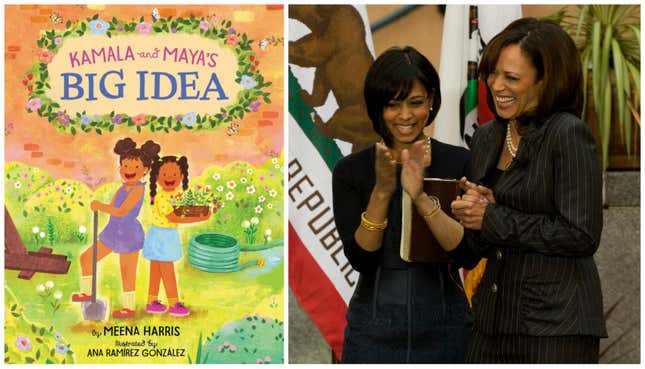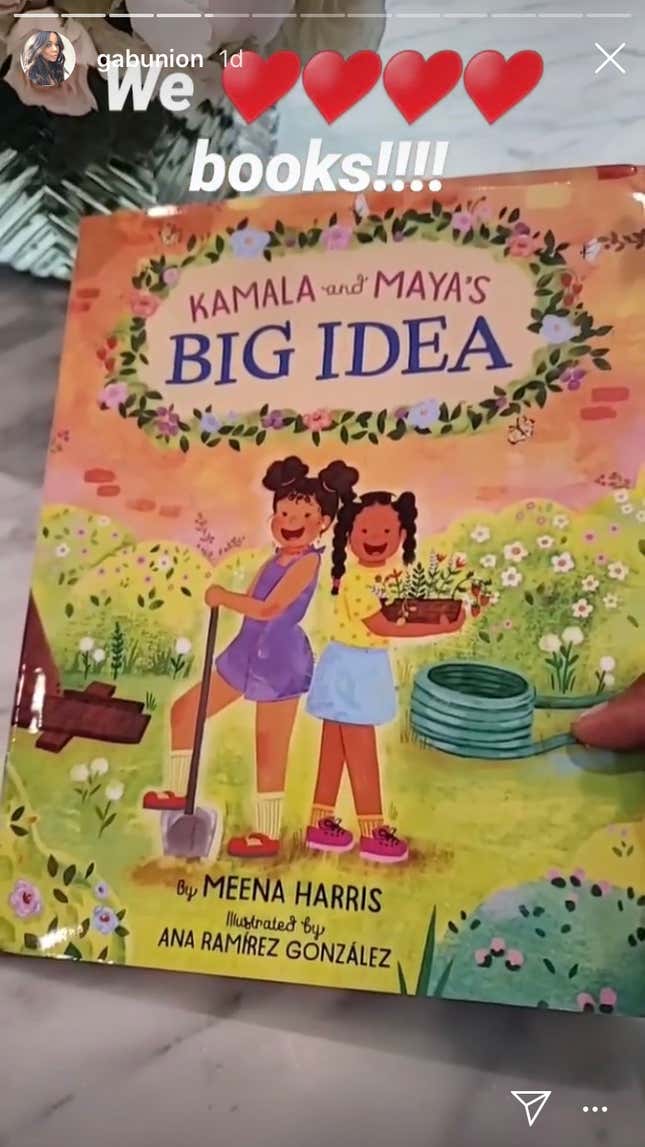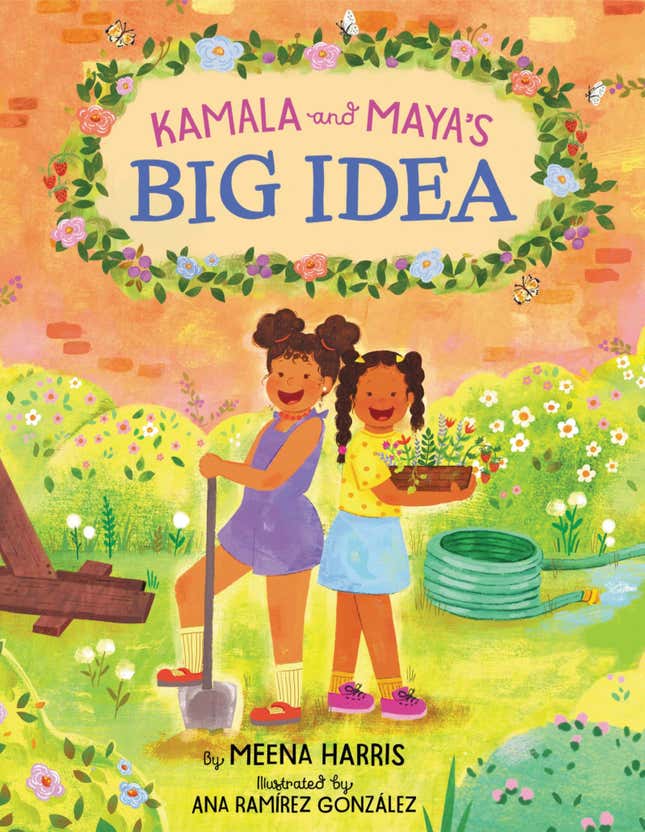
Senator Kamala Harris (D-Calif.) is a consistent presence in our news cycle, currently due to being considered a frontrunner among Joe Biden’s potential running mates for the White House. Of course, Harris also made headlines before and during her own 2020 presidential run for her incisive and seemingly fearless delivery during hearings and debates, which Biden memorably experienced firsthand last June. Her sister Maya, a fellow attorney, is also a political power-player, acting as an advisor on Hillary Clinton’s 2016 presidential campaign, as campaign chairwoman for her older sister’s 2020 run, and as a political analyst for MSNBC. Their mother is the late Dr. Shyamala Gopalan Harris, a breast cancer researcher and activist who served on the President’s Special Commission on Breast Cancer during her lifetime.
It is this legacy of dynamic, change-making women that Maya’s daughter Meena Harris, also a lawyer and founder of the Phenomenal Women activism campaign and lifestyle brand, draws upon when discussing the inspiration behind her first book, Kamala and Maya’s Big Idea, due for release by HarperCollins Publishers on June 2. If you’re thinking that’s a cute title for a biography on political insiders, it’s not quite the tome you might be imagining. In fact, the children’s book is a retelling of a story Meena grew up hearing from the women in her family, recounting how her mother and aunt became early community organizers when they galvanized their neighbors into transforming the vacant lot next to their building into a playground.
“There are many reasons I wrote it, but the very first reason was I grew up in this incredible environment surrounded by these three really strong and—even in my child’s eye back then—really powerful women of color and black women, and that was my grandmother, my mom and my aunt,” Harris told The Glow Up earlier this year, a few weeks after Kamala ended her presidential campaign. “I just loved hearing stories about them and looking at pictures of them growing up—they were so central to my upbringing,” she continued. “But then, to also—through my grandmother, especially—learn about who they were as kids was really special to me and something I loved as a child, and this was one of those stories that I heard.”
It’s a story the California senator shared on the campaign trail, and it’s hard not to smile at the thought of a little Kamala and sister Maya putting their then-precocious political savvy to work. As the book illustrates, community organizing can be as simple as being brave enough to ask for what you need, pooling resources and talents, and creating basic, easily executable strategies. This is the lesson Meena, now with two daughters of her own, wanted to share with both her own and other families.
“I think the lessons are not only unique to the environment I grew up in, which is something I want to memorialize for my own daughters,” she explained. “But now as a mother myself, and having founded the Phenomenal Woman action campaign and engaging with some of these issues, I see how valuable it can be to share that with other parents and to really engage in a dialogue with adults about how do you really your kids with a spirit and feeling of responsibility, of making an impact?”
While Kamala and Maya’s Big Idea may be centered around two thoughtful and determined little girls, it’s really a story about community—one equally relevant and relatable for all children and their parents.
“One other really heartening thing is seeing so many parents of sons saying “I can’t wait to read this with my son,” Meena said. “This isn’t just for black girls or girls of color; I think that it is just as important for boys to engage with this—and for that matter, for white children to engage with it. I think it’s just as important to have representation for my daughters as it is for children in less diverse communities to be engaging with content in books around black children…I think that’s so important.”
Also important is what Meena’s contribution to the genre—with illustrations by former Pixar Development Artist Ana Ramirez Gonzalez (Coco)—represents. In 2018, 7% of children’s book authors were black, Latinx or Native, while over half of children’s books written about people of color were written by white authors. That “diversity gap” isn’t lost on Meena, who is proud to be part of a new wave of voices entering the space, which now also includes books by celebs Lupita Nyong’o and Gabrielle Union. Union has already praised Kamala and Maya’s Big Idea, as has Stacey Abrams, who called it “[a]n inspiring tale” (h/t Amazon).

“I also carry with me a feeling of purpose and responsibility there, as well: to have it not only be a children’s book about black girls and women of color but also being written by a woman of color, illustrated by a woman of color—unfortunately that’s still somewhat rare,” Meena explained, noting how essential it was to even get the hair of her two young heroines right on the page. “That was another reason why I wanted to write this...I’m excited to kind of be building on this conversation, and I’m still learning, too.”
Though she never could’ve predicted it, there has perhaps been no better time than the downtime and dynamics of our present crisis to begin instilling in children (and their parents) a sense of communal responsibility and empowerment to enact positive change with consideration for the greater good. This is the message at the heart of Kamala and Maya’s Big Idea, and another component of the Harris legacy that began with Meena’s civil rights activist grandparents.
“The way Kamala has talked about it is when she was growing up she was surrounded by adults marching and shouting about justice and equality and civil rights,” Meena shared. “I think I got a lot of that too, but you know in a different way. Obviously, it wasn’t in the ‘60s, but my grandmother and all of them still carried this deep commitment to making sure that I, even as a child, was really exposed to the same commitment and responsibility. And not only constantly telling me—you know, talking about it with me in the context of current events and politics and things like that—but also showing it in their actions.
“I think that is a key kind of step for parents to think about...how to talk to your kids about racism or race,” she continued. “Yes, we have to talk about this stuff—we have to learn how to have these conversations—and then also, we have to show our kids that we’re doing it, too.”

Meena referenced the 2017 Women’s March that followed Donald Trump’s inauguration as a pivotal point in her understanding of how much people were craving conversations and guidance on everyday activism. “You had so many incredible women, but like, ordinary women—everyday folks just saying ‘What can I do in my community? What can I do in my own space, in my own neighborhood to use my voice, to speak up, to do something?’
“It has to be ongoing; it has to be like real deep engagement,” she said in response to her own question, later adding: “We’re seeing it already, but I think it’s up to all of us to be actively engaging in these conversations; not only with adults, but again, with our kids…When I think about these conversations around equity and activism, and working around things like equal pay and opportunity and advancement for women in the workplace, I also think about the fact that it almost feels like it’s too late by the time we’re having that conversation…
“We know this stuff starts early; we know that the bad stuff—in terms of social norms and dimming girls light and treating them differently than boys starts super young, right?” she continued. “Although I’m right now choosing to do this through a children’s book, I think that this stuff is just as if not more important than the conversations we’re having around women because if you are not paying attention to it this early, 20 years down the road is almost too late...I think we have to really elevate the conversation around girls—and boys, too, for that matter—because it comes down to cultural norms.”
One need look no further than her now-famous aunt to understand how powerful representation can be in shifting those norms. In fact, Meena suggested that perhaps Kamala Harris’ greatest legacy may be the enduring impact she makes upon little girls of color, girls like the ones she and Maya once were.
“Some of the most emotional moments for me when she was on the campaign trail were these images and videos of her with these young girls,” Meena recounted. “You know, many of them black and brown girls who were just looking at her and seeing them themselves.”
Speaking in February as the COVID-19 crisis was just dawning, Meena also agreed we currently have a critical opportunity to heighten our awareness and understanding of civic issues that will affect generations to come. In addition to making her own contribution to the conversation via Phenomenal Woman and Kamala and Maya’s Big Idea, she’s personally been drawing inspiration from Gen Z; especially young climate activists.
“It is an opportunity where we’re not only seeing heightened engagement with politics,” she said, suggesting, “but lean into that, and think about how you’re gonna look back and talk about this moment with your kids, and with your grandkids.”
This interview was edited and condensed for clarity. Kamala and Maya’s Big Idea is available June 2, 2020, and for preorder now at major booksellers and at phenomenalgirl.com.

